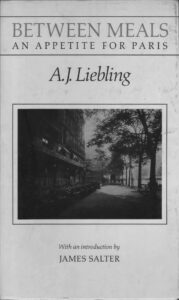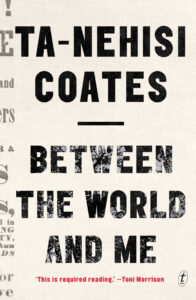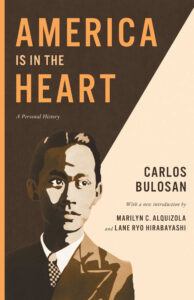Tag: Dr. René Alexander Orquiza Assistant Professor of History
American Must-Reads: Between Meals: An Appetite for Paris
by The Cowl Editor on January 17, 2019
Arts & Entertainment
Life is too short to read everything. It may even be too short to major in american studies, history, or English. This column, brought to you by professors in american studies, history, and English, highlights the books you simply cannot let pass, whatever your major. Start your list!
by: Dr. René Alexander Orquiza Assistant Professor of History

For the best meal of your life, New Yorker writer A.J. Liebling has some simple advice: it helps if you are young and broke. His remembrance in Between Meals: An Appetite for Paris of the meals he savored during his junior year abroad in 1920s Paris is packed full of details any foodie would love: multiple course dinners lasting four hours, tableside carving service on porcelain plates, rich sauces that had taken days to prepare, and waiters dressed in immaculately tailored uniforms.
Liebling’s Paris was tragically ephemeral, a city deep in post-World War I depression and inevitably doomed from the imminent arrival of World War II. But French pride still persisted in food. A strong dollar and a weak Franc meant Liebling could partake in one four-star meal a month—if he sacrificed eating well for the other 29 days. He had a part-time job as a reporter and ostensibly took classes at the Sorbonne on French literature and history after having graduated from Columbia. In retrospect, it is clear that his real classroom was the dining rooms of Paris. His joyful descriptions of conversations with waiters, friendships he struck with restaurateurs, and the anticipation and thinking behind what he was going to order for his monthly extravagance shows his deepest thoughts concerned his stomach.
We have all heard the expression “you are what you eat,” but Between Meals tells of a deeper message. If you spend a lot of time eating sparsely, the time you eat well can be a window into the person you want to be.
American Must-Reads: Between the World and Me
by The Cowl Editor on October 25, 2018
Arts & Entertainment
Life is too short to read everything. It may even be too short to major in american studies, history, or English. This column, brought to you by professors in american studies, history, and English, highlights the books you simply cannot let pass, whatever your major. Start your list!
by: Dr. René Alexander Orquiza Assistant Professor of History
Unfortunately, the message of Ta-Nehisi Coates’ Between the World and Me has largely been obscured by haters and trolls. Many were jealous of his accomplishments—a MacArthur genius grant and a Pulitzer Prize finalist—and accused him of borrowing too heavily from academic studies.

But perhaps the importance of Coates’ work is how he makes some of the most essential questions of contemporary America—racial inequality in the justice system, the lack of black men in higher education, the use of prisons as a new Jim Crow—accessible to both experts and novices alike.
Coates wrote the book as a letter to his son, an approach he borrowed from James Baldwin’s letters to his nephew in his seminal 1963 book The Fire Next Time. He tells his son some of his hopes, dreams, fears, and thoughts of how to navigate an inherently unequal society as a young black man.
Inspired by the death of a friend from Howard University at the hands of the police, Coates pleads for his son to live the full life he knows many African American men cannot. An essential part of that fulfillment is books, and as the son of a former radical bookstore owner in Baltimore and a former investigative newspaper reporter in Washington, D.C., Coates shows just how much he believes literature is key to interrogating the world. Between the World and Me provides compelling answers to some of the most difficult questions on race, justice, and democracy in America today.
American Must-Reads: America is in the Heart
by The Cowl Editor on October 4, 2018
Arts & Entertainment
by: Dr. René Alexander Orquiza Assistant Professor of History

Life is too short to read everything. It may even be too short to major in American Studies, History, or English. This column, brought to you by professors in American Studies, History, and English, highlights the books you simply cannot let pass, whatever your major. Start your list!
The news is full of difficult stories about immigration, but history provides humbling examples of just how difficult America’s relationship with immigrant rights has always been. Carlos Bulosan’s America Is in the Heart describes how racism affected Filipino immigrants in the 1930s. Born in the Philippines when the country was still an American colony, Bulosan immigrated when he was 17 with hopes of living the American dream. He hustled his way up and down the West Coast—picking asparagus and strawberries in Central California, gutting fish in Seattle, even serving on dangerous fishing expeditions in Alaska. The wages were smaller than expected, but his experiences with racism truly shattered his conception of the United States. A white mother told Bulosan that she did not trust him around her daughter. The Great Depression sharpened the cry to save work for whites, and Bulosan was soon jobless and living in poverty.
Yet he endured by retreating to books. He began reading everything he could about race in the United States, devouring Richard Wright’s Native Son, and struck up a correspondence with John Steinbeck. Bulosan decided that he should write about his experiences with race in the United States as well. Diagnosed with exhaustion and confined to a bed in Los Angeles General Hospital, he penned this account.
And we are richer for it. America Is in the Heart demonstrates how immigrants have long been ignored and written out of the nation’s story. More importantly, it shows how race has long handcuffed the nation from realizing the country’s founding ideals, particularly for the newly-arrived in search of a better life.
